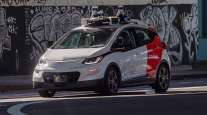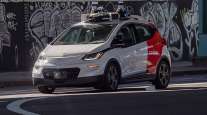Does Tesla Probe Signal a Get-Tough Era at NHTSA?

[Stay on top of transportation news: Get TTNews in your inbox.]
The National Highway Traffic Safety Administration’s investigation into a possible defect involving Tesla Inc.’s Autopilot may signal a more activist approach by the Biden administration to regulating technology that is crucial to the auto industry’s future.
NHTSA, which announced the Tesla examination Aug. 16, opened 26 probes into various auto-safety issues so far this year — more than in all of 2020 or 2019, according to its website. The agency is on pace to launch about 66% more investigations than the 25 it began last year.
Since President Joe Biden was inaugurated in January, NHTSA also has stepped up its pace of investigations into Tesla crashes. Nine probes into Tesla crashes have been opened since March, the most recent occurring in San Diego last month.
“Biden has picked leadership that is independent-minded and safety-conscious,” said Jamie Court, president of Consumer Watchdog, a Los Angeles-based public advocacy group.
NHTSA said it launched the Tesla probe, which covers an estimated 765,000 vehicles from the 2014 model year onward, after 11 cars using Autopilot collided with fire trucks, police cruisers or other vehicles at crash scenes. The incidents resulted in 17 injuries and one fatality.

What's next for data gathering and analytics programs in trucking? Host Seth Clevenger speaks with Andrew Johnson of PrePass Safety Alliance and Chris Orban of Trimble Transportation. Hear a snippet above, and get the full program by going to RoadSigns.TTNews.com.
Tesla shares fell more than 4% as of noon EDT Aug. 17 after declining 4.3% on Aug. 16, their biggest drop in 2½ months.
The probe could take some time, Goldman Sachs analysts said in a note, adding that an update “to ensure driver compliance with Tesla’s terms of use” could help resolve the issue.
The Aug. 16 announcement, combined with an order in June requiring car manufacturers including Tesla to report crashes involving automated-driving technology, shows that NHTSA is becoming more aggressive on the issue generally.
“Taken together, that order and this particular enforcement action could be the beginnings of a more active safety enforcement agenda for NHTSA,” said Paul Hemmersbaugh, who served as the agency’s general counsel under former President Barack Obama and now heads transportation work at law firm DLA Piper LLP.
It also is consistent with the agency’s aggressive approach to increasing vehicle fuel economy announced Aug. 5, Hemmersbaugh said. He cautioned that he hadn’t spoken directly to current officials about their plans for Tesla or autonomous vehicle regulation.
Virtually all U.S. automakers are offering a variety of advanced driver-assistance systems, technologies that can help motorists park, stay in their lane and avoid collisions. These systems help the driver with a combination of sensors, cameras and radar, but completely autonomous vehicles still aren’t commercially available.
It’s important for regulators to get a handle on driver-assistance technologies, especially as carmakers push toward fully driverless vehicles, said Jake Fisher, director of auto testing at Consumer Reports.
“In a way that we have not seen in 50 or even 100 years, the control of the vehicle is fundamentally changing and it’s very serious,” Fisher said. “The technology has advanced so quickly, it’s really left regulators scrambling to try to keep up. It’s terrific that the regulators are finally realizing how serious this is.”
NHTSA didn’t immediately respond to a request for comment on whether the Tesla probe signals a more aggressive approach to auto safety regulation. Tesla and Eric Williams, the company’s associate general counsel for regulatory issues, also didn’t respond.

Homendy
The new chairwoman of the National Transportation Safety Board, which investigates highway safety issues but has no regulatory authority, praised NHTSA’s announcement. Jennifer Homendy, who was sworn in Aug. 13, call it “a positive step forward” and said she was “encouraged by NHTSA’s leadership taking action in ensuring advanced driving assistance systems function safely.”
Homendy challenged Tesla in a series of tweets Dec. 29 while she was an NTSB board member, over the company’s marketing of what it calls “Full Self-Driving” capability in its cars.
"Full self-driving" suggests that the vehicle can drive itself right now, without input from a human operator. That's not true. There should be safeguards in place to prevent such deceptive claims. Where's @NHTSA? 3/4 — Jennifer Homendy (@JenniferHomendy) December 29, 2020
In a Feb. 1 letter to NHTSA urging broader oversight of autonomous vehicles, NTSB said the lack of rules had created a Wild West environment in which companies such as Tesla were testing unregulated technology and putting the public at risk.
Ben Shneiderman, a computer science professor at the University of Maryland who studies human-computer interactions, said it is too soon to tell if the Tesla probe is a sign of a more aggressive regulatory approach. But he said it’s long overdue.
“We can’t just allow these companies to go do these things,” he said. The social structure and governance around artificial intelligence “has to be broader than Google claiming, ‘Trust us, we’re really careful.’ Same thing for Tesla.”
Jason Levine, executive director at the Center for Auto Safety, said it is too early to reach any conclusions about NHTSA under Biden.
“There’s no doubt they have been more active when it comes to enforcement, but the goal is to be more effective and to make people safer on our roads,” Levine said. “The jury is still out on that question.”
— Keith Laing, Alan Levin and Keith Naughton compiled this report, with assistance from Dana Hull.
Want more news? Listen to today's daily briefing below or go here for more info:




